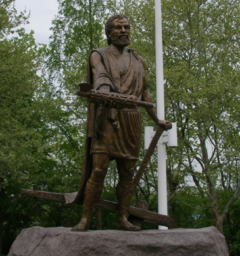
Back لوشيوس كوينكتيوس سنسيناتوس Arabic لوشيوس كوينكتيوس سنسيناتوس ARZ Луцый Квінкцый Цынцынат Byelorussian Луций Квинкций Цинцинат Bulgarian Lucius Quinctius Cincinnatus Breton Luci Quinti Cincinnat (cònsol 460 aC) Catalan Cincinnatus Czech Lucius Quinctius Cincinnatus Danish Lucius Quinctius Cincinnatus German Κιγκινάτος Greek
Lucius Quinctius Cincinnatus | |
|---|---|
 | |
| Born | c. 519 BC |
| Died | c. 430 BC (aged c. 89) |
| Nationality | Roman |
| Office | |
| Spouse | Racilia |
| Children | |
| Family | Quinctia gens |
| Military service | |
| Battles/wars | Battle of Mount Algidus (458 BC) |
Lucius Quinctius Cincinnatus (c. 519 – c. 430 BC) was a Roman patrician, statesman, and military leader of the early Roman Republic who became a legendary figure of Roman virtue—particularly civic virtue—by the time of the late Republic.
Modern historians question some particulars of the story of Cincinnatus that was recounted in Livy's History of Rome and elsewhere, but it is usually accepted that Cincinnatus was a historical figure who served as suffect consul in 460 BC and as dictator in 458 BC and (possibly) again in 439 BC.
The most famous story related to Cincinnatus occurs after his retirement from public service to a simple life of farming. As Roman forces struggled to defeat the Aequi, Cincinnatus was summoned from his plough to assume complete control over the state. After achieving a swift victory in sixteen days,[1] Cincinnatus relinquished power and its privileges, returning to labor on his farm.
Cincinnatus's success and his immediate resignation of near-absolute authority at the end of the crisis (traditionally dated to 458 BC) has often been cited as a model of selfless leadership, civic virtue, and service to the greater good. The story has also been seen as an exemplar of agrarian virtues like humility, modesty, and hard work.[2] Cincinnatus was an opponent of the rights of the plebeians (the common citizens) who fell into poverty because of his son Caeso Quinctius's violent opposition to their desire for a written code of equally enforced laws.
- ^ Hillyard, Michael J. (2001). Cincinnatus and the Citizen-Servant Ideal: The Roman Legend's Life, Times, and Legacy. Xlibris Corporation. ISBN 978-1-4628-0465-8.
- ^ Arena, Valentina; Prag, Jonathan R. W.; Stiles, Andrew (2022-01-25). A Companion to the Political Culture of the Roman Republic. John Wiley & Sons. ISBN 978-1-4443-3965-9.
© MMXXIII Rich X Search. We shall prevail. All rights reserved. Rich X Search